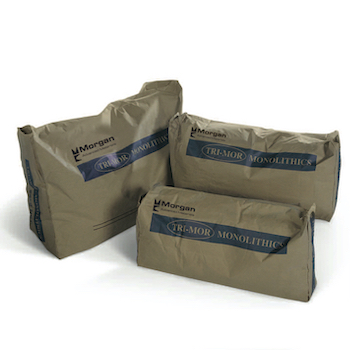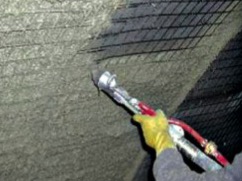 Thermal insulation cement FIRELITE
Thermal insulation cement FIRELITE
 Refractory mixture TRI-MOR MORFLO 160
Refractory mixture TRI-MOR MORFLO 160
 Refractory mixture TRI-MOR MORFLO 164
Refractory mixture TRI-MOR MORFLO 164
 Refractory mixture TRI-MOR MIDCAST
Refractory mixture TRI-MOR MIDCAST
 Refractory mix TRI-MOR ALCOAT
Refractory mix TRI-MOR ALCOAT
 Refractory mixture TRI-MOR PLASGUN
Refractory mixture TRI-MOR PLASGUN
 Refractory mixture TRI-MOR GUNCRETE BFS
Refractory mixture TRI-MOR GUNCRETE BFS
 Refractory mix FIREBARRIER 110 / FIREBARRIER 135
Refractory mix FIREBARRIER 110 / FIREBARRIER 135

Morgan Thermal Ceramics produce a range of Monolithic materials which can be placed in-situ by casting, gunning, parging, trowelling or ramming. Particular grades will be selected depending on the structure to be lined. A lining may be installed using a single material or can be a complex selection depending on the environment and operation of the lined structure. Specific grades have been developed for high temperature insulation, metal contact, slag resistance, abrasion resistance or thermal shock resistance. Morgan Thermal Ceramics offer an extensive range of Alumino-silicate and Silicon Carbide based Monolithic grades.
Monolithics Tri-Mor® range:
Insulating: Firelite®, Kaolite®, Tri-Mor® (Blockmix, Coolcast®, Extralite, Insulcast, Insulite).
These grades are used for the containment of heat within high temperature operating structure. They can be used for either hot face working linings or as backing linings behind higher density working linings.
Dense: Firecrete®, Kaocrete®, Tri-Mor® (Midcast, HT, BF Cast, 1800T Guncrete, etc).
Dense and Conventional grades are bonded by high alumina cements. These grades are easily placed by casting or gunning and offer good performance in most general applications.
Low Cement: Tri-Mor® Hicast, Morflo, Higun.
As the name suggests these grades are formulated with low cement, typical 5-7%. They also incorporate fine fillers and dispersants which significantly reduce water demand and enhance physical properties. Several grades can be placed with little or no vibration.
Medium Cement: Tri-Mor® Vibrotek.
These grades contain cement additions of 10 to 15%
and offer easy mixing and installation. They offer excellent resistance to abrasion and thermal shock for general purpose application.
Clay Bonded: Tri-Mor® Plastics, Plascast, Plasgun.
The original monolithic materials were clay bonded plastics/mouldables. Grades today can be supplied, with similar properties, which can be cast or gunned. Clay bonded grades have excellent thermal shock resistance.
Aluminium Resistance: Tri-Mor® Alcast, Albond, Alumor, Alcoat.
These grades have been specifically developed with enhanced resistance to corundum growth which can occur when molten aluminium is in contact with refractory materials. Particular grades are available for installing by casting, gunning, veneering or coating.
Phosphate Bonded: Tri-Mor® Plastic, Morbond, Morgun.
It is well known that refractory compositions bonded with phosphate binders offer excellent resistant to most molten metals and slags. Grades are available which can be installed by ramming, casting or gunning.
Dry Vibratory: Tri-Mor® TV90, TV80.
This material is installed dry and consolidated by vibration to form a dense lining. On heating the material it forms a sintered, strong lining.
Cements and Mortars: Airset, Blakite, Triset, JM.
These are fine grained compositions, which can be supplied dry and ready mixed. They are used for bonding bricks or fibre modules in furnace linings.
Special Duty Grades: Kao-Tuff®.
These grades have been specifically developed for particular applications where abrasion resistance is essential.
Benefits:
Linings generally provide lower thermal conductivity results compared to traditional dense brick constructions, achieving greater heat savings.
They are faster to install, resulting in:
• faster turnaround of repairs and maintenance;
• lower operational costs;
• greater production availability;
• give reduced stock levels of expensive special brick shapes;
• monolithic lining reduced joints;
• easy to repair;
• form complex shapes easily;
• good thermal shock resistance;
• improve thermal efficiency.
Applications:
Aluminium
• Joint Free Lining
Reduced joint penetration by molten Al
Reduced mechanical damage and no ‘brick pull out’
• Reduced Lining Thickness Increased furnace capacity
• Easy to Repair
Easier to patch repair than brick linings
Wide range of compatible repair materials available
• Fast Installation Rates
Materials can be mixed in bulk, at fast installation rates without the need for time served brick layers
• Higher Technology Products
New generation monolithic refractories are out-performing brick linings
• Elimination of Special Shapes
Monolithic linings can be cast to intricate designs without the need for special shapes
• Material availability
Monolithics can be supplied at much shorter lead times compared to brick linings
Iron & Steel
• Blast Furnace Repairs
Remote controlled stack gunning
• Steel Ladle Safety Linings
• Reheating Furnace
• Pipe Protection and Insulation G Heat Treatment Applications G Pre Cast shapes
Petro Chemical
• Fluid Catalytic Cracking Unit (FCCU) G Vibration Casting of Transfer Lines
• Process Heaters
• Reformers and Pyrolysis Units
• Convection Section
• Side Wall convection
• Underfired Floor Section
Power Generations
• Wood fired boilers G Recovery boiler
• Radiant boiler
• Fluidised bed boiler G Water tube boiler
• Fire tube boiler

